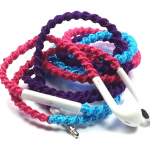We are born with five senses, and as we grow older, those senses begin to diminish. While we can still have the ability to taste, feel, and smell, our eyes and ears begin to noticeably weaken with age. Now, we here at Ear-Buds.org are certainly not going to beat around the bush: Earbuds CAN lead to hearing loss, but they don’t have to.
As a matter of fact, hearing loss is completely preventable. You just have to realize that loud sounds do cause damage to your ears. There really is no way around it. It’s a sad story that the youth of today’s age will most likely have great hearing problems at much younger ages compared to previous generations. Earbuds make it so that loud noises can be brought directly into ear canals.
The most important thing you must realize is that any sound over 85 decibels can cause hearing loss. According to NoiseProblems, 85 decibels is any noise which you have to shout over in order to be heard. Many earbuds advertise specifications of decibels of around 110. Though this is a charming number, you should rarely, if ever, listen to your music a loud volume. A dance club is generally around 110 decibels, and a rock concert is at 120 decibels, and a jet is at 130 decibels (headwize). Even though these numbers are far apart, they stand as great comparisons to your package 110db’s.
There is absolutely no reason for you to blast your music for at such high volumes.
Many people badly train their ears to take in more and more sound. We believe that mistreatment of sound mainly comes from poor earbuds. When you invest in cheap earbuds, the sound quality is so shoddy that the only way to make the music experience more joyful is to crank up the volume. We’ve been advising you, for quite a while, to invest in expensive earbuds. When you buy better pairs of earbuds, you will be able to hear beautiful tones at ridiculously lower volumes. Try to keep your music low enough so that it stays at 85db’s. By the way, if you can stick to 85db’s, you won’t experience any hearing loss at all (NIDCD).
The basic science behind hearing loss is that you have hair cells inside of your ears that pick up sound waves and convert them into electrical signals which your brain can interpret (Headwize). When you listen to loud sounds constantly, the vibrations and destroy your hair cells. Unlike other cells in your body, your hair cells can never grow back once they are damaged.
The general rule of thumb is that if your music is too loud, just turn it down. Don’t think 85db’s is too low- NOT AT ALL. New York City Traffic is generally around 85db’s. It’s loud, but you can still have a conversation around it if you speak loudly enough. This is the loudest your earbuds should be. Also note that each decibels increase in multiplied increments of power; therefore, an increase in 10 decibels from 110db’s to 120db’s equals 10 times more power, but our ears will only notice that the sound is twice as loud (NIDCD).
What this means is that you can still jam your heart out, but do you seriously need a dance club in your ear canals? The pressing issue is that a dance club itself isn’t so bad when compared to earbuds delivering the same power directly to your canals. In other words, it is MUCH safer to be at a dance club than it is to have that same club inside of your ears. Also, limit the amount of time you spend listening to your earbuds, if you can help it. This will bring you an optimum hearing experience spread throughout your lifetime. But, we know very well that music can become very addicting, so if you want to listen to it 24/7, then buy a NICE par of earbuds. Don’t be afraid to drop a good $150 on a set. Your hearing is worth it.
Rule of Thumb: 85 decibels are hard to measure on a volume scale. A third of the volume, is generally considered safe for prolonged exposure. Half of the volume is safe for short exposure
Footnotes
“Frequently Asked Noise Reduction Questions.” Noise Control, Acoustic Panels, Acoustic Wall Panel, Noise Reduction. Web. 09 Sept. 2010. <http://www.noiseproblems.com/RapidCat/Catalog/PageTemplate.cfm?template=/RapidCat/Common/ViewPage.cfm&PageId=1694#4>.
“HeadWize – Article: Preventing Hearing Damage When Listening With Headphones (A HeadWize Headphone Guide).” HeadWize – Breaking News. Web. 09 Sept. 2010. <http://gilmore2.chem.northwestern.edu/articles/hearing_art.htm>.
Honan, Mathew. “Listen Up: Tips for IPod and Hearing Safety, Accessories, Macworld.” Apple, Mac, IPhone, IPad, and IPod Reviews, Help, Tips, and News | Macworld. Web. 09 Sept. 2010. <http://www.macworld.com/article/60274/2007/10/hearingprotection.html>.
“Hooked on Headphones? Personal Listening Devices Can Harm Hearing, Study Finds.” Science Daily: News & Articles in Science, Health, Environment & Technology. Web. 08 Sept. 2010. <http://www.sciencedaily.com/releases/2010/08/100831221525.htm>.
“Noise-Induced Hearing Loss.” National Institute on Deafness and Other Communication Disorders [NIDCD]. Web. 09 Sept. 2010. <http://www.nidcd.nih.gov/health/hearing/noise.asp>.
“Noise-Induced Hearing Loss.” National Institute on Deafness and Other Communication Disorders [NIDCD]. Web. 09 Sept. 2010. <http://www.nidcd.nih.gov/health/hearing/noise.asp>.
“Prevalence of Hearing Loss among US Adolescents Has Increased Significantly.” Science Daily: News & Articles in Science, Health, Environment & Technology. Web. 08 Sept. 2010. <http://www.sciencedaily.com/releases/2010/08/100817161100.htm>.


no comment until now